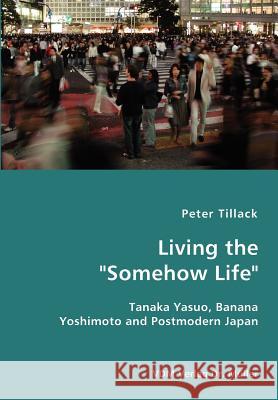Living the Somehow Life-Tanaka Yasuo, Banana Yoshimoto and Postmodern Japan » książka
Living the Somehow Life-Tanaka Yasuo, Banana Yoshimoto and Postmodern Japan
ISBN-13: 9783836427500 / Angielski / Miękka / 2007 / 180 str.
Living the Somehow Life-Tanaka Yasuo, Banana Yoshimoto and Postmodern Japan
ISBN-13: 9783836427500 / Angielski / Miękka / 2007 / 180 str.
(netto: 217,52 VAT: 5%)
Najniższa cena z 30 dni: 226,53 zł
ok. 16-18 dni roboczych
Bez gwarancji dostawy przed świętami
Darmowa dostawa!
Tanaka Yasuo's Nantonaku, kurisutaru (Somehow, Crystal, 1980) and Yoshimoto Banana's Kitchin (Kitchen, 1987) have been denigrated as em-ble-matic of a so-called "bastardized line" of Japanese literature, characterized by an un-abashed celebration of a "late-capitalist" consumerist ethos. Close rea-dings of these works are undertaken in order to demonstrate that, while these works are reflective of late-capitalist postmodern Japan (the de-ve-lop-ment of which is delineated prior to the readings), they nonetheless posit uniquely post-modern strategies for critically engaging issues of identity for-ma-tion and main-tenance, and the creation of meaning as they appear in the con-temporary Japanese socio-cultural nexus. I argue that if such strategies are not immedi-ately apparent, it is because they hold to what critic Fredric Jameson, in his dis-cussion of the requisites for a "new political art," calls "the truth of postmo-dernism." This work will interest those concerned with postwar and contemporary Japa-nese culture, society and literature, as well as those engaged in the study of "global culture."
Tanaka Yasuos Nantonaku, kurisutaru (Somehow, Crystal, 1980) and Yoshimoto Bananas Kitchin (Kitchen, 1987) have been denigrated as emblematic of a so-called "bastardized line" of Japanese literature, characterized by an unabashed celebration of a "late-capitalist" consumerist ethos. Close readings of these works are undertaken in order to demonstrate that, while these works are reflective of late-capitalist postmodern Japan (the development of which is delineated prior to the readings), they nonetheless posit uniquely postmodern strategies for critically engaging issues of identity formation and maintenance, and the creation of meaning as they appear in the contemporary Japanese socio-cultural nexus. I argue that if such strategies are not immediately apparent, it is because they hold to what critic Fredric Jameson, in his discussion of the requisites for a "new political art," calls "the truth of postmodernism."This work will interest those concerned with postwar and contemporary Japanese culture, society and literature, as well as those engaged in the study of "global culture."











